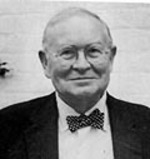On this date in 1905, Joseph Francis Fletcher III was born in Newark, N.J. He received a B.A. from West Virginia University before going on to receive a bachelor of divinity from Berkeley Divinity School in 1929 and a doctor of sacred theology from the University of London in 1932. He was ordained an Episcopal priest, but later renounced his belief in God and identified as a humanist.
Fletcher was a philosopher and a theologian whose work in the field of biomedical ethics was pioneering. Even when he was religious, his ethics were humanist, based on human suffering and consequences rather than biblical rules. He was an advocate for family planning, abortion, euthanasia and the sterilization of unfit parents.
He taught Christian ethics and pastoral theology at the Episcopal Theological School from 1944 to 1970, and medical ethics at the University of Virginia at Charlottesville from 1970 to 1977. He wrote several books, including Morals and Medicine (1954), Situation Ethics (1966), and Humanhood: Essays in Biomedical Ethics (1979). He was also a founding member of Planned Parenthood, the Association for Voluntary Sterilization, Society for the Right to Die and the Soviet-American Friendship Society.
In an autobiographical essay published posthumously in Memoir of an Ex-Radical, Fletcher describes his loss of faith at age 65, which he says was at first prompted by a realization that the church would never be a significant advocate in the social justice movement. He wrote: “[This realization] forced me to take a hard look at Christian doctrine itself, on its own merits: God, Jesus, revelation, sin, salvation — the whole repertory. Looking at it like that, I said to myself what I no doubt often glimpsed along the way, that the whole thing was weird and untenable.”
After this experience, Fletcher did not immediately resign from his position at the Episcopal Theology School. He called himself “an alienated or unbelieving theologian.” (D. 1991)


